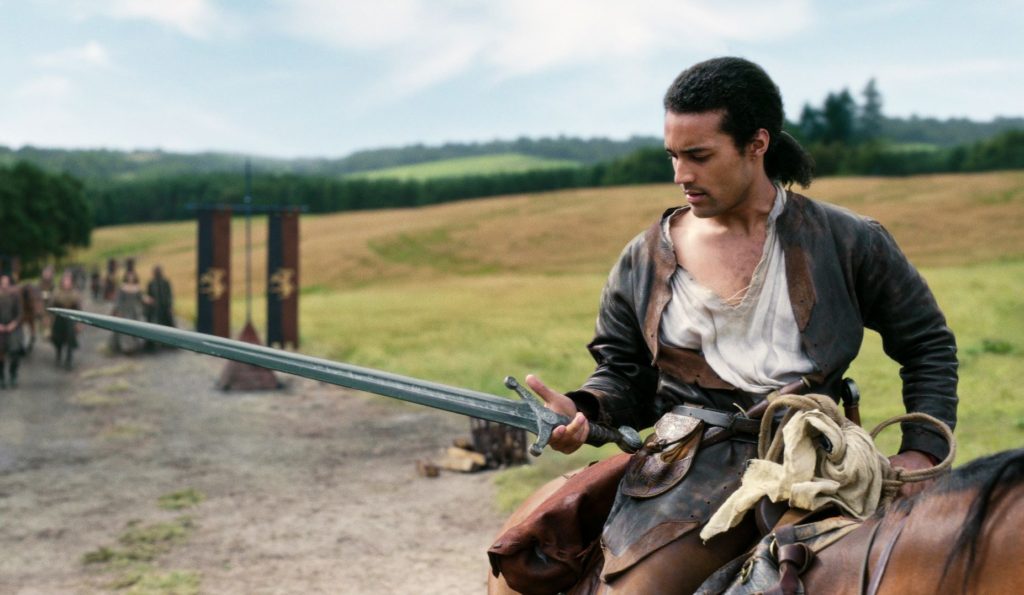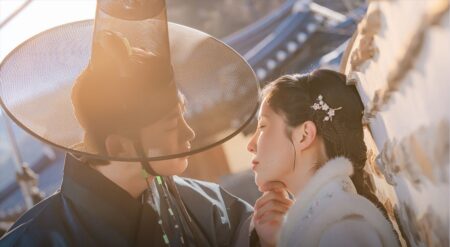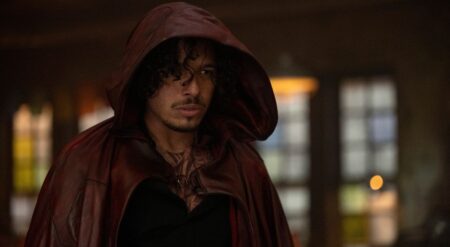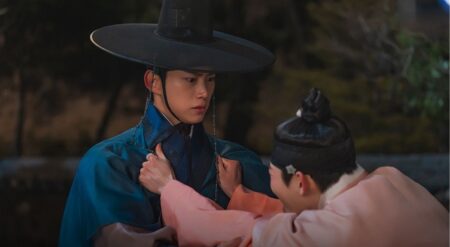
There are many television series and films that are based on retelling Arthurian legend. While this is one of my favorites stories, it can also get stale with each new iteration trying to be different and winding up so close to the same. That was my fear coming into Cursed and thankfully it had no grounds. Based on the New York Times bestselling book, Cursed is a re-imagination of the Arthurian legend, told through the eyes of Nimue (Katherine Langford), a young woman with a mysterious gift who is destined to become the powerful (and tragic) Lady of the Lake. After her mother’s death, she finds an unexpected partner in Arthur (Devon Terrell), a humble mercenary, in a quest to find Merlin and deliver an ancient sword. Over the course of her journey, Nimue will become a symbol of courage and rebellion against the terrifying Red Paladins, and their complicit King Uther.
At its core, Cursed is a coming-of-age story but it also confronts themes that remain timeless and are even more relevant now given the current state of the world. We see the zealotry of faith and its violence, the destruction of the natural world, and a senseless war built on hatred of others. But it’s through this adversity that Nimue gains strength, by confronting it all and finding courage when it would be easier to run away. In this way, Nimue represents a dynamic protagonist who is trusted to carry the series’ story. When she begins to fight back with the sword entrusted to her that she shines.
My only real issue with the series is that Nimue, while a part of a group of being hunted, a Fey, she is still white. A central theme for the series is that the Fey are being targeted, killed, and hunted relentlessly by the Red Paladins. Those who help the Fey and a large portion of the Fey themselves are played by actors of color. In addition to being fodder for much of the story, they are also the only characters in the show who don’t speak English at all or speak broken English at best. And while Cursed’s themes are important, it falls into the same trap of many other fantasy narratives that uses a central white figure as the way to see marginalization, and in this one, given the diverse cast, makes it stand out all the more. This is heightened more so when you realize that the antagonists of this story are white as well. While this is optics, it’s important for narratives that look to tell stories of marginalization and oppression to take them into consideration, even in fantasy.
That said, Cursed is far from the stories you’ve seen before, not just because it is told from Nimue’s perspective but because it subverts expectations when it comes to both story beats, archetypes, and most important characters. Where The Witcher looked to blend expectations using timelines, Cursed does so with its characters, their origins, and our memories of them. In fact, Cursed delivers even more so with its surprises the more that you know about the Arthurian legend. This includes Arthur.

While Arthur is present in this story and portrayed by Devon Terrell in a charismatic way, this is Nimue’s story. Balancing the man we know to be the hero of the story against a tragic protagonist is tough. It would have been easy for Terrell to overshadow her but the narrative is maintained and Nimue remains its focal point. That said, Arthur is given agency, identity, and is written in a way that his path to the Arthur we know in the traditional legend is in the future, and yet not detached. As a pair, they work well together, even if their chemistry is nearly non-existent, despite the script’s best efforts.
Additionally, Cursed accelerates its narrative midway through the season, picking up its pace and action by blending in characters and elements never shown in the popular retellings of King Arthur. While the beginning of the season is timider and focused on exposition and world-building this shifts with episode four. This is the point where characters take their stands and truly enter their individual journeys and they begin to weave together. But it’s because of this that some characters begin to stand out more than others, mainly because of their ability to command the scene even when a lot of elements are going on. The chief among these is Gustaf Skarsgård as Merlin. No stranger to the magic and the past, Skarsgård’s portrayal of Merlin is both reminiscent of but different from his role in Vikings as the eccentric Floki. Which stands out given the northern visitors that show up to begin a tangential story that runs along Nimue’s and Arthur’s.
Finally, Cursed’s costume design is phenomenal, with each piece worn by both main characters and extras alike carrying a story. In addition to costuming, the practical effects work, especially in terms of make-up for the Fey stands out. That said, while the practical shines, there are many scenes throughout the season that it’s clear that actors are performing on a green screen. In some moments, like watching a forest burn it is enough to pull you out of the scene, and offers distraction instead of immersion.
Overall, Cursed delivers on its use of Arthurian legend while also creating a unique story that pushes past your expectations both in larger narrative direction and characters. But, in doing this, the series falls into some of the same pitfalls that fantasy often does, by not looking at how the identity of the actors playing the characters would impact their overall thematic goal. That being said, for fans of fantasy and a tale as old as time, this one is worth the watch.
Cursed is streaming now, exclusively on Netflix.
Cursed
-
Rating - 7/107/10
TL;DR
Cursed delivers on its use of Arthurian legend while also creating a unique story that pushes past your expectations both in larger narrative direction and characters. But, in doing this, the series falls into some of the same pitfalls that fantasy often does, by not looking at how the identity of the actors playing the characters would impact their overall thematic goal. That being said, for fans of fantasy and a tale as old as time, this one is worth the watch.






